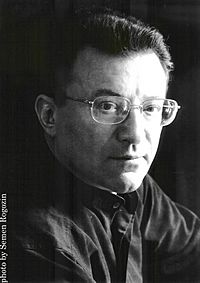Leonid Perlovsky facts for kids
Leonid Perlovsky is a professor and researcher at Northeastern University. He studies how our brains think and solve problems. He also looks at how languages and cultures change over time.
Contents
Who is Leonid Perlovsky?
Leonid Perlovsky has been a professor at other universities too. These include Novosibirsk State University and New York University. He also helped start companies. These companies created tools for understanding text, for biotechnology (which uses living things to make products), and for predicting money trends.
His Work and Achievements
Mr. Perlovsky has written many articles, over 320 of them! He has also written 10 book chapters and three books. One of his books, Neural Networks and Intellect, is about how computers can learn like brains. It has been printed many times.
He helps edit important science magazines. He is an editor for IEEE Transactions on Neural Networks. He also works for New Mathematics and Natural Computation and is the main editor for Physics of Life Reviews.
Awards and Recognition
Leonid Perlovsky has won many awards for his work. In 2005, he received the IEEE Distinguished Member of Boston Section Award. In 2007, he won the US AFRL Charles Ryan Memorial Award for his basic research. He also got the Gabor Award, which is a top engineering award from the International Neural Network Society. The same year, he received the John McLucas Award. This is the highest science award from the US Air Force.
What Does He Research?
Leonid Perlovsky's main research is about how our minds work. He studies things like:
- Neural modeling fields: How our brains create mental maps and ideas.
- Knowledge instinct: The natural drive we have to learn and understand.
- Aesthetic emotions: The feelings we get from beauty, like from art or music.
- Cognitive dissonance: The uncomfortable feeling when our beliefs don't match our actions.
- Language evolution: How languages change and grow over time.
- Language and cognition: How language affects our thinking.
- Evolution of consciousness: How our ability to be aware of ourselves has developed.
- Music's role: How music helps our minds and cultures grow.
- Science and religion: He explores how scientific ideas can explain the importance of special values. He also looks at how religious goals can be similar to scientific causes.
 | Tommie Smith |
 | Simone Manuel |
 | Shani Davis |
 | Simone Biles |
 | Alice Coachman |


